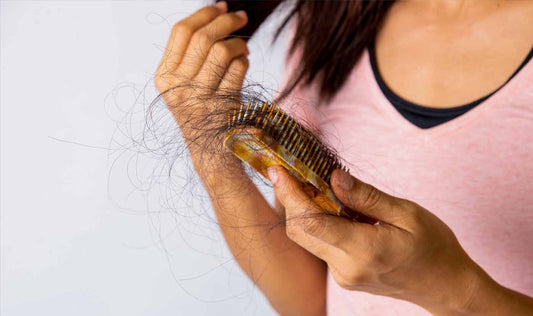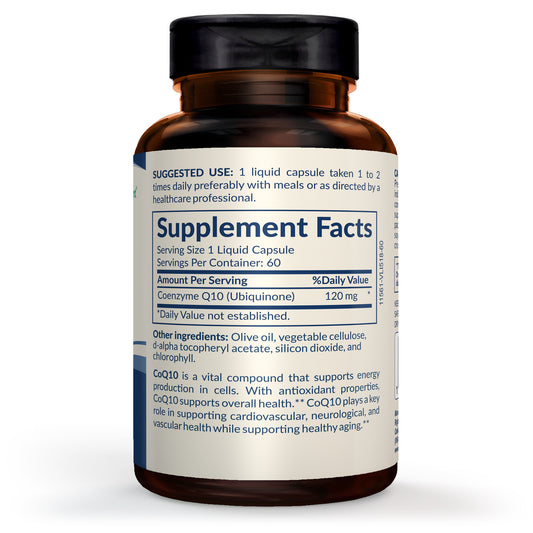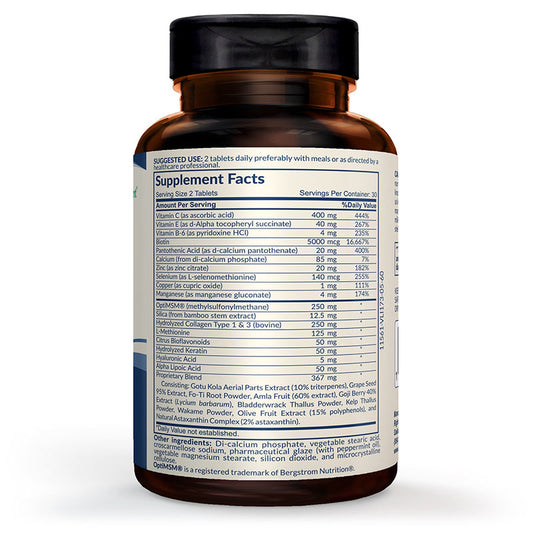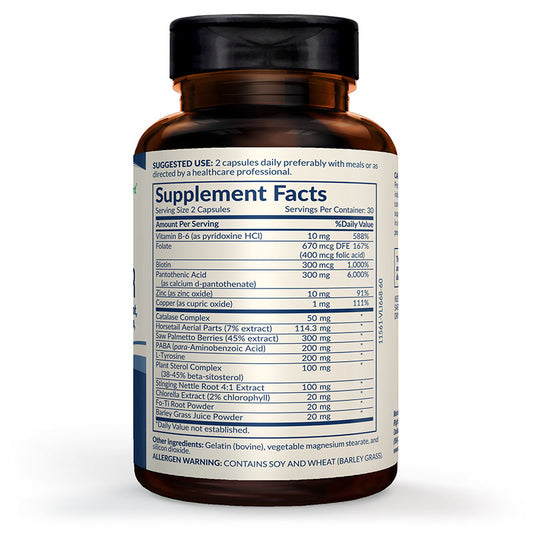Understanding the Connection Between Thyroid Dysfunction and Hair Loss
Hair loss is a common issue that affects people across different age groups and genders.
One possible cause of hair loss is thyroid dysfunction.
Thyroid hormones are vital regulators of many essential bodily functions, including metabolism, growth and development, protein synthesis, cardiovascular health, nervous system activity, reproductive health, and gastrointestinal function. Maintaining balanced thyroid hormone levels is crucial for overall health and well-being.
If you're experiencing hair loss and suspect you might have a thyroid condition, this blog is for you!
The Role of Thyroid Hormones
The thyroid gland produces thyroxine (T4), a prohormone that is converted into the active hormone triiodothyronine (T3) by deiodination enzymes in peripheral tissues. The cellular response to T3 is mediated by nuclear thyroid hormone receptors, specifically TRα and TRβ, which act as transcription factors regulating gene expression by binding to DNA. These receptors are found in various hair follicular cells, suggesting that thyroid hormone directly influences hair growth.
Hair Growth Cycle and Telogen Effluvium
Telogen Effluvium (TE) is a common type of hair loss that occurs when there is an increase in the number of hair follicles entering the resting (telogen) phase of the hair growth cycle. This condition results in noticeable shedding of hair and can be triggered by various factors, including stress, hormonal changes, and certain medications.
The Hair Growth Cycle
To understand Telogen Effluvium, it's important to know the basics of the hair growth cycle, which consists of three main phases:
-
Anagen (Growth) Phase:
- This is the active growth phase of hair follicles, lasting 2-7 years.
- Approximately 85-90% of hair follicles are in this phase at any given time.
-
Catagen (Transition) Phase:
- A short transitional phase that lasts about 2-3 weeks.
- Hair growth stops, and the follicle shrinks.
-
Telogen (Resting) Phase:
- The resting phase lasts about 2-4 months.
- Hair follicles remain dormant before eventually shedding the old hair and starting a new growth cycle.
Thyroid Dysfunction and Hair Loss
The association between thyroid dysfunction and hair loss, including TE, has been extensively investigated.
Hypothyroidism and Hair Loss
Several studies have demonstrated a significant association between hypothyroidism and TE. Hypothyroidism disrupts the hair growth cycle by inhibiting cell division in the epidermis and skin appendages, resulting in an increased number of hairs in the resting phase. The prolonged telogen phase eventually results in excessive shedding of resting hair, leading to the typical hair loss seen in TE.
Hyperthyroidism and Hair Loss
Hyperthyroidism accelerates the body's metabolism, which can disrupt the normal hair growth cycle. Here’s how:
-
Accelerated Hair Growth Cycle:
- Hyperthyroidism can cause hair follicles to enter the anagen (growth) phase rapidly, but also exit it prematurely, leading to an increased number of hairs entering the telogen (resting) phase simultaneously.
-
Nutrient Diversion:
- The increased metabolic rate associated with hyperthyroidism can divert essential nutrients away from hair follicles to other vital organs, resulting in weakened hair.
-
Autoimmune Factors:
- Graves' disease, the most common cause of hyperthyroidism, is an autoimmune disorder. Autoimmune attacks can also target hair follicles, leading to hair loss.
Several studies have investigated the relationship between hyperthyroidism and hair loss:
-
Prevalence of Hair Loss in Hyperthyroid Patients:
- Research indicates that approximately 50% of patients with hyperthyroidism experience significant hair shedding. This hair loss often precedes other clinical symptoms of hyperthyroidism.
-
Mechanisms of Hair Loss:
- Studies suggest that the rapid turnover of hair follicles caused by hyperthyroidism leads to a higher proportion of hairs entering the telogen phase. This condition, known as telogen effluvium, results in diffuse hair thinning and shedding.
-
Impact of Treatment on Hair Loss:
- Treatment of hyperthyroidism, particularly with antithyroid medications or radioactive iodine, can help restore normal thyroid hormone levels and reduce hair loss. However, the regrowth of hair may take several months after achieving euthyroid status (normal thyroid function).
If you suspect thyroid dysfunction as the cause of your hair loss, consulting with a healthcare professional is crucial for proper diagnosis and treatment.
Common Symptoms of Hypothyroidism
-
Fatigue and Weakness
- Persistent tiredness
- Lack of energy
- Muscle weakness
-
Weight Gain
- Unexplained weight gain
- Difficulty losing weight despite diet and exercise
-
Cold Intolerance
- Sensitivity to cold temperatures
- Feeling cold even in warm environments
-
Dry Skin and Hair
- Dry, rough, or flaky skin
- Brittle or thinning hair
- Hair loss
-
Constipation
- Infrequent or difficult bowel movements
-
Puffy Face
- Swelling in the face, particularly around the eyes
-
Hoarseness
- Changes in voice quality, such as hoarseness
-
Muscle and Joint Pain
- Aches and stiffness in muscles and joints
- Carpal tunnel syndrome
-
Heavy or Irregular Menstrual Periods
- Menorrhagia (heavy menstrual bleeding)
- Irregular menstrual cycles
-
Depression and Cognitive Issues
- Depressed mood or feeling of sadness
- Memory problems or difficulty concentrating
-
Bradycardia
- Slow heart rate
Common Symptoms of Hyperthyroidism
-
Weight Loss
- Unintentional weight loss despite normal or increased appetite.
-
Rapid Heartbeat (Tachycardia)
- Elevated heart rate, often more than 100 beats per minute.
- Heart palpitations or an irregular heartbeat (arrhythmia).
-
Increased Appetite
- Heightened sense of hunger and increased food intake.
-
Nervousness and Anxiety
- Feelings of nervousness, anxiety, or irritability.
- Difficulty concentrating.
-
Tremors
- Trembling or shaking, especially in the hands and fingers.
-
Sweating and Heat Intolerance
- Excessive sweating and an intolerance to heat.
- Feeling excessively warm in normal or cool environments.
-
Changes in Menstrual Patterns
- Lighter, less frequent menstrual periods in women.
-
Fatigue and Muscle Weakness
- Persistent tiredness and muscle weakness, particularly in the upper arms and thighs.
-
Goiter
- Enlargement of the thyroid gland, causing a visible swelling at the base of the neck.
-
Sleep Disturbances
- Difficulty sleeping (insomnia).
How to Diagnose Thyroid Disease
Diagnosing thyroid disease involves a combination of medical history, physical examination, and various tests to evaluate thyroid function and detect any abnormalities. Here’s a comprehensive guide on how thyroid disease is diagnosed:
1. Medical History and Physical Examination
Medical History:
- Discuss symptoms with your healthcare provider.
- Provide information about any family history of thyroid disease or autoimmune disorders.
- Mention any medications you are taking, as some can affect thyroid function.
Physical Examination:
- The doctor will check for physical signs of thyroid problems, such as an enlarged thyroid gland (goiter), swelling in the neck, and changes in skin texture or hair.
The doctor may also check your pulse and reflexes
2. Blood Tests:
Blood tests are the primary method for diagnosing thyroid disease. These tests measure the levels of thyroid hormones and thyroid-stimulating hormones (TSH) in your blood.
Thyroid Function Tests:
- TSH (Thyroid-Stimulating Hormone): Elevated TSH levels may indicate hypothyroidism, while low TSH levels may suggest hyperthyroidism.
- Free T4 (Thyroxine): Measures the level of thyroxine in the blood. Low levels can indicate hypothyroidism, and high levels can indicate hyperthyroidism.
- Free T3 (Triiodothyronine): Sometimes measured if hyperthyroidism is suspected.
Thyroid Antibody Tests:
- Thyroid Peroxidase Antibodies (TPOAb): Elevated levels can indicate autoimmune thyroid conditions, such as Hashimoto’s thyroiditis or Graves’ disease.
- Thyroglobulin Antibodies (TgAb): May be measured in certain cases of thyroid cancer or autoimmune thyroid diseases.
- TSI (Thyroid-Stimulating Immunoglobulin): Typically measured if Graves’ disease is suspected.
3. Imaging Tests
Imaging tests can provide detailed information about the structure and function of the thyroid gland.
Thyroid Ultrasound:
- Uses sound waves to create images of the thyroid gland.
- Helps detect nodules, cysts, and goiters.
- Can distinguish between solid and fluid-filled nodules.
Radioactive Iodine Uptake (RAIU) and Scan:
- Measures how much iodine the thyroid gland absorbs from the bloodstream.
- A small amount of radioactive iodine is swallowed, and its uptake by the thyroid gland is measured.
- Can help diagnose hyperthyroidism and identify the cause of thyroid dysfunction.
Fine-Needle Aspiration Biopsy
If a thyroid nodule is detected, a fine-needle aspiration (FNA) biopsy may be performed to determine if it is benign or malignant.
Procedure:
- A thin needle is inserted into the thyroid nodule to collect a small sample of cells.
- The sample is examined under a microscope to check for cancerous cells.
Additional Tests
In some cases, additional tests may be needed to further evaluate thyroid function or to diagnose specific conditions.
Thyroid Scan:
- Like the RAIU test but provides a detailed image of the thyroid gland.
- Helps identify the size, shape, and position of the thyroid gland and any abnormalities.
CT scan or MRI:
- These imaging tests may be used if more detailed information about the thyroid gland and surrounding structures is needed.
Conclusion
Thyroid dysfunction is a significant factor in hair loss, affecting both the growth cycle and the overall health of hair follicles. Understanding the link between thyroid hormones and hair growth can help in identifying and treating hair loss related to thyroid conditions.
Besides thyroid medication, individuals experiencing hair loss should consult their healthcare provider about appropriate topical treatments and the potential benefits of supplements such as collagen, vitamin D, and biotin.
References:
Bin Dayel S, Hussein RS, Atia T, Abahussein O, Al Yahya RS, Elsayed SH. Is thyroid dysfunction a common cause of telogen effluvium?: A retrospective study. Medicine (Baltimore). 2024 Jan 5;103(1):e36803. doi: 10.1097/MD.0000000000036803. PMID: 38181279; PMCID: PMC10766245.














